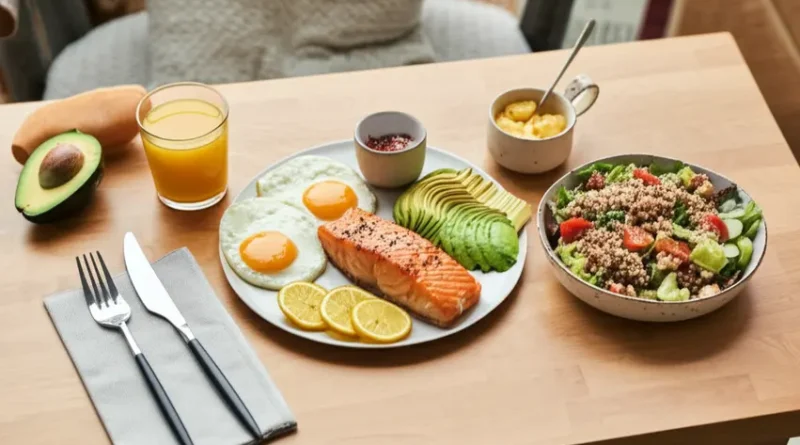What to Eat in a Day: A Guide to Balanced Nutrition
In today’s fast-paced world, the question of what to eat can often feel overwhelming. With countless diet trends, conflicting information, and time constraints, many people are left wondering how to nourish their bodies effectively. This blog post will serve as a guide to help you create a balanced meal plan for a day, focusing on diverse foods that not only taste great but also promote overall health.
Starting the Day Right: Breakfast
Breakfast is often called the most important meal of the day. It energizes you for the opportunities ahead, making it crucial to include a mix of macronutrients. A balanced breakfast may consist of:
- Protein: Consider scrambled eggs or Greek yogurt, both excellent sources of protein that help keep you full.
- Healthy Fats: Incorporate avocado on whole-grain toast or a handful of nuts. These fats aid in nutrient absorption and provide long-lasting energy.
- Complex Carbohydrates: Oatmeal topped with fresh fruits or a smoothie made with spinach, banana, and some oats can help fuel your morning activities.
Example Breakfast: Two scrambled eggs with spinach and feta, a slice of whole-grain toast with avocado, and a bowl of mixed berries.
Mid-Morning Snack
As the hours roll on, a mid-morning snack can help bridge the gap between breakfast and lunch. Keep it light yet nutritious:
- Fruits: An apple or banana provides quick energy along with essential vitamins and minerals.
- Nut Butter: Pair your fruit with a tablespoon of almond or peanut butter for an added protein boost.
Example Snack: A medium apple with two tablespoons of almond butter.
Time for Lunch
Lunch is the time to refuel for the day, so it’s essential to ensure it includes a variety of food groups:
- Lean Proteins: Chicken breast, fish, or plant-based proteins like lentils or chickpeas are both satisfying and nutritious.
- Whole Grains: Brown rice, quinoa, or whole-grain pasta can provide sustained energy.
- Vegetables: Fill half your plate with colorful vegetables—think leafy greens, bell peppers, and carrots. The more varied, the better!
- Bonuses: Add a dressing made of olive oil and vinegar for flavor and healthy fats.
Example Lunch: A quinoa salad with mixed greens, cherry tomatoes, grilled chicken, cucumbers, and a light olive oil dressing.
Afternoon Pick-Me-Up
The afternoon slump can be challenging, but a nutrient-dense snack can help:
- Yogurt: Greek yogurt is rich in protein. Try it topped with some granola and nuts for added flavor and crunch.
- Veggies and Hummus: Carrot sticks or cucumber slices dipped in hummus provide fiber and hydration.
Example Snack: A small bowl of Greek yogurt with a handful of granola and a drizzle of honey, or carrot sticks with hummus.
Evening Fuel: Dinner
Dinner is the perfect opportunity to unwind and dedicate time to a nourishing meal:
- Proteins: Lean meats, fish, or plant proteins like black beans or chickpeas are vital at this meal.
- Healthy Fats: Avocados, olive oil or fatty fish like salmon can add flavor and health benefits.
- Vegetables: Opt for a colorful mix, whether steamed, roasted, or stir-fried.
- Whole grains or starchy vegetables: Quinoa, sweet potatoes, or brown rice offer carbohydrates needed after a long day.
Example Dinner: Grilled salmon with a side of steamed broccoli and quinoa, drizzled with olive oil and lemon.
Late-Night Snack
If you find yourself feeling hungry before bed, a light, healthy snack can signal your body it’s time to wind down. Avoid heavy or overly sugary foods:
- Dark Chocolate: A square of dark chocolate can satisfy sweet cravings without a sugar crash.
- Herbal Tea: Sipping chamomile or peppermint tea can aid digestion and promote relaxation.
Example Late-Night Snack: A small piece of dark chocolate paired with a cup of herbal tea.
In conclusion, what you eat in a day should encompass various food groups, ensuring your body receives the proper nutrients it needs to function optimally. With balanced meals and snacks from morning through night, you’ll likely notice an increase in energy, improved mood, and overall health. The key is variety, moderation, and mindfulness in your food choices.

